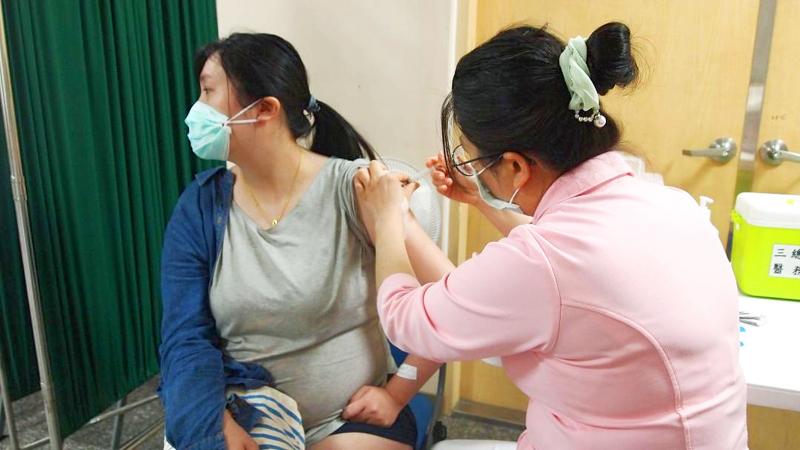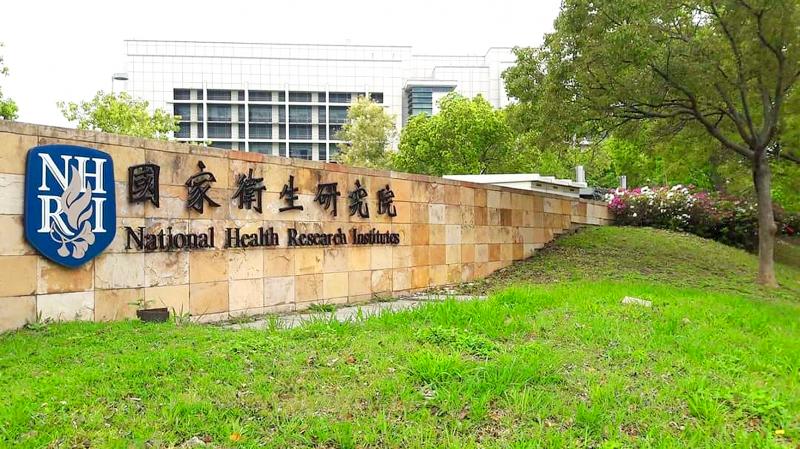The National Health Research Institutes is reportedly preparing to initiate talks with Moderna Inc for authorization to manufacture its COVID-19 vaccine in Taiwan, a local magazine said yesterday.
If successful, Taiwan would be able to manufacture anywhere between 300 million and 500 million doses within six to nine months, the Chinese-language Mirror Media said.
The institute has its eye on manufacturing messenger ribonucleic acid (mRNA) vaccines for its second vaccine plant expansion project, Liu Chia-chyi (劉家齊), a researcher at the institute’s vaccine research and development center, told a news conference yesterday.

Photo: Liu Yu-ching, Taipei Times
Speaking at a news conference yesterday, Liu said that the planned second vaccine manufacturing plant would include hardware that would be capable of manufacturing mRNA vaccines once Taiwan obtains the know-how.
Obtaining the knowledge to manufacture mRNA vaccines is critical, as mRNA vaccines are the go-to solutions for the “100-day mission” discussed by G7 leaders earlier this month to prepare for future pandemics, he said.
However, while mRNA vaccines are the new trend for combating the COVID-19 pandemic, it remains to be seen whether they can produce long-lasting antibodies in the human body, he added.

Photo: Cheng Ming-hsiang, Taipei Times
Taiwanese companies developing COVID-19 vaccines are focused on protein subunit vaccines, a low-risk technology that Taiwan already possesses, he said.
“Safe and effective vaccines are what we should aim for,” he said.
Chang Gung University Research Center for Emerging Viral Infections professor Shih Shin-ru (施信如) said mRNA vaccines are the quickest to research and develop.
Foreign countries are trending toward using mRNA vaccines as the first shot, while using protein subunit vaccines as the second shot to increase immunity in the human body, she said.
Shih said the institute should conduct extended research on existing subunit vaccines while simultaneously obtaining key knowledge in manufacturing mRNA vaccines.
Separately, the institute said that the Food and Drug Administration and the Ministry of Economic Affairs are tallying what resources Taiwan could bring to bear before official talks with Moderna can commence.
Regardless of which company Taiwan works with, they would want to know that the nation would be able to produce a guaranteed amount of vaccines, institute president Liang Kung-yi (梁賡義) said.
Liang sidestepped the question of whether it was possible to manufacture 300 million to 500 million doses within a six-to-nine-month time frame, saying: “The important thing is whether we have the ability to make them.”
Minister of Health and Welfare Chen Shih-chung (陳時中), who heads the Central Epidemic Command Center, said the government would try its best to obtain authorization to manufacture foreign COVID-19 vaccines, but added that to date, such negotiations have yet to bear fruit.
The plan is to finish the second vaccine manufacturing plant within three years and obtain a Good Manufacturing Practice certificate with one to one-and-a-half years, Liang said.
Additional reporting by Wu Liang-yi

A magnitude 7.0 earthquake struck off Yilan at 11:05pm yesterday, the Central Weather Administration (CWA) said. The epicenter was located at sea, about 32.3km east of Yilan County Hall, at a depth of 72.8km, CWA data showed There were no immediate reports of damage. The intensity of the quake, which gauges the actual effect of a seismic event, measured 4 in Yilan County area on Taiwan’s seven-tier intensity scale, the data showed. It measured 4 in other parts of eastern, northern and central Taiwan as well as Tainan, and 3 in Kaohsiung and Pingtung County, and 2 in Lienchiang and Penghu counties and 1

FOREIGN INTERFERENCE: Beijing would likely intensify public opinion warfare in next year’s local elections to prevent Lai from getting re-elected, the ‘Yomiuri Shimbun’ said Internal documents from a Chinese artificial intelligence (AI) company indicated that China has been using the technology to intervene in foreign elections, including propaganda targeting Taiwan’s local elections next year and presidential elections in 2028, a Japanese newspaper reported yesterday. The Institute of National Security of Vanderbilt University obtained nearly 400 pages of documents from GoLaxy, a company with ties to the Chinese government, and found evidence that it had apparently deployed sophisticated, AI-driven propaganda campaigns in Hong Kong and Taiwan to shape public opinion, the Yomiuri Shimbun reported. GoLaxy provides insights, situation analysis and public opinion-shaping technology by conducting network surveillance

‘POLITICAL GAME’: DPP lawmakers said the motion would not meet the legislative threshold needed, and accused the KMT and the TPP of trivializing the Constitution The Legislative Yuan yesterday approved a motion to initiate impeachment proceedings against President William Lai (賴清德), saying he had undermined Taiwan’s constitutional order and democracy. The motion was approved 61-50 by lawmakers from the main opposition Chinese Nationalist Party (KMT) and the smaller Taiwan People’s Party (TPP), who together hold a legislative majority. Under the motion, a roll call vote for impeachment would be held on May 19 next year, after various hearings are held and Lai is given the chance to defend himself. The move came after Lai on Monday last week did not promulgate an amendment passed by the legislature that

AFTERMATH: The Taipei City Government said it received 39 minor incident reports including gas leaks, water leaks and outages, and a damaged traffic signal A magnitude 7.0 earthquake struck off Taiwan’s northeastern coast late on Saturday, producing only two major aftershocks as of yesterday noon, the Central Weather Administration (CWA) said. The limited aftershocks contrast with last year’s major earthquake in Hualien County, as Saturday’s earthquake occurred at a greater depth in a subduction zone. Saturday’s earthquake struck at 11:05pm, with its hypocenter about 32.3km east of Yilan County Hall, at a depth of 72.8km. Shaking was felt in 17 administrative regions north of Tainan and in eastern Taiwan, reaching intensity level 4 on Taiwan’s seven-tier seismic scale, the CWA said. In Hualien, the